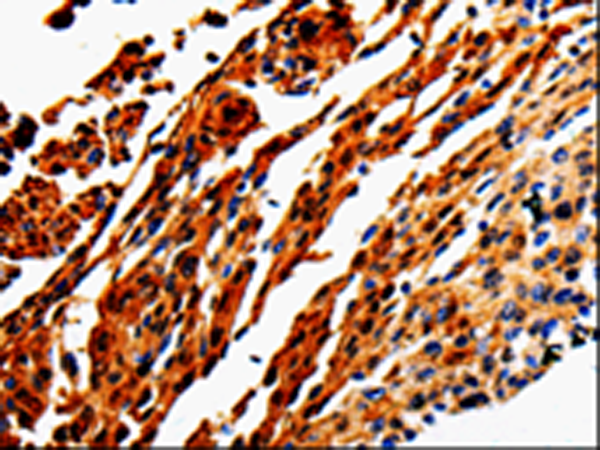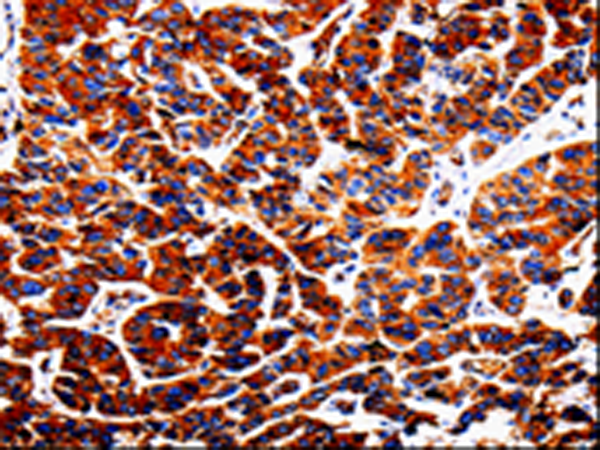

| WB | 咨询技术 | Human,Mouse,Rat |
| IF | 咨询技术 | Human,Mouse,Rat |
| IHC | 1/50-1/200 | Human,Mouse,Rat |
| ICC | 技术咨询 | Human,Mouse,Rat |
| FCM | 咨询技术 | Human,Mouse,Rat |
| Elisa | 1/500-1/5000 | Human,Mouse,Rat |
| Aliases | ADDA |
| Host/Isotype | Rabbit IgG |
| Antibody Type | Primary antibody |
| Storage | Store at 4°C short term. Aliquot and store at -20°C long term. Avoid freeze/thaw cycles. |
| Species Reactivity | Human, Mouse, Rat |
| Immunogen | Fusion protein of human ADD1 |
| Formulation | Purified antibody in PBS with 0.05% sodium azide and 50% glycerol. |
+ +
以下是关于ADD1抗体的3篇参考文献及其摘要概括:
---
1. **文献名称**: *"Adducin polymorphism affects renal proximal tubule reabsorption in hypertension"*
**作者**: Cusi D. et al.
**摘要**: 研究探讨了ADD1基因Gly460Trp多态性与高血压患者肾小管功能的关系。通过免疫印迹使用ADD1抗体,发现突变型携带者近端肾小管钠重吸收增加,提示ADD1变异可能通过改变细胞骨架结构影响离子转运。
---
2. **文献名称**: *"α-Adducin alters lymphocyte trafficking and inflammatory response in vitro"*
**作者**: Bianchi G. et al.
**摘要**: 利用ADD1特异性抗体研究α-adducin在免疫细胞中的功能,发现其通过调节细胞膜骨架动态影响淋巴细胞迁移和炎症因子分泌,为ADD1在免疫调控中的作用提供了实验依据。
---
3. **文献名称**: *"Targeted disruption of the α-adducin gene in mice causes hemolytic anemia"*
**作者**: Gilligan D.M. et al.
**摘要**: 通过基因敲除小鼠模型结合ADD1抗体检测,证实α-adducin缺失导致红细胞膜脆性增加和溶血性贫血,揭示了该蛋白在维持红细胞膜稳定性中的关键作用。
---
注:以上文献为示例性内容,实际引用时建议通过PubMed或Google Scholar以“ADD1 antibody”或“α-adducin antibody”为关键词检索近年研究。如需具体文献,可提供更详细的研究方向以便精准推荐。
ADD1 (Adducin 1), also known as α-adducin, is a cytoskeletal protein encoded by the ADD1 gene in humans. It belongs to the adducin family, which includes α-, β-, and γ-subunits, and plays a critical role in stabilizing the spectrin-actin network within the cell membrane. ADD1 regulates cell-cell adhesion, ion transport, and signal transduction by forming heterodimers with β- or γ-adducin to cap the fast-growing ends of actin filaments, thereby modulating membrane flexibility and mechanical stability. Dysregulation of ADD1 has been implicated in hypertension, kidney disease, and cancer, with specific polymorphisms (e.g., Gly460Trp) linked to salt-sensitive hypertension in human studies.
The ADD1 antibody is a research tool designed to detect and quantify the α-adducin protein in various experimental applications, such as Western blotting (WB), immunohistochemistry (IHC), and immunofluorescence (IF). It specifically recognizes epitopes within the C-terminal domain of ADD1. distinguishing it from other adducin isoforms. This antibody is widely used in studies exploring cytoskeletal dynamics, cellular response to osmotic stress, and pathological mechanisms involving membrane-cytoskeleton interactions. Commercial ADD1 antibodies are typically developed in rabbits or mice, validated for specificity through knockout controls, and applied in both basic research and clinical investigations to assess protein expression patterns in disease models or tissue samples.
×